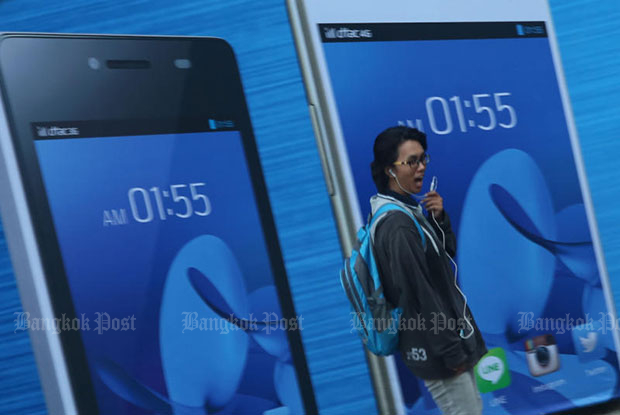
Third-ranked mobile operator Total Access Communication (DTAC) plans to ask the telecom regulator for a one-year remedy period for the 1800 and 850-megahertz spectrum serving its 900,000 subscribers if its mobile concession, which will expire in September 2018, is not auctioned on time.
Chairman Boonchai Bencharongkul said he is not concerned on whether the planned auction is held before the expiry of the concession, as the company has to start considering options now on how to avoid disrupting its users' service.
The 1800 and 850MHz spectrum ranges are now operated by DTAC under the concession of state-owned enterprise CAT Telecom, which will expire on Sept 30 of next year.
The National Broadcasting and Telecommunications Commission (NBTC) is accelerating preparations of the auction for the two spectrum ranges. The draft auction design, which is based on the 4G licence auction in 2015, was approved by the NBTC board on Nov 8.
But the existing NBTC board will not conduct the auction for the 1800 and 850MHz licences. The board's six-year term expired on October 2017, but it will continue regulating telecom and broadcasting business until a new board is formed.
The NBTC Act implemented in June requires the government to recruit a new NBTC to replace the old board.
Although the National Legislative Assembly's NBTC selection committee started the recruitment process last month, it is hard to predict when the new NBTC appointees will be officially approved, said Mr Boonchai.
Moreover, it is still uncertain whether the new NBTC board will try to auction the 1800 and 850-MHz spectrum ranges before September of next year, as it may decide to reconsider the existing NBTC's auction draft.
"I think the auction may not take place before DTAC's concession expires in September 2018."
"Spectrum ranges used by mobile operators under state enterprises' concessions have never been reallocated through auction before their expiry date," said Mr Boonchai.
DTAC is the only remaining operator providing service under concession from a state enterprise.
The NBTC began the auction for 3G licences on the unoccupied range of the 2100-MHz spectrum in 2012. Three years later it auctioned 4G licences on the 1800- and 900-MHz spectra.
Mr Boonchai said DTAC is monitoring the planned auction and is ready to join the bidding once the auction is official.
"Whatever will be, will be. We (DTAC) are positive and focused on providing the best service possible to our current customers, while also preparing for any situation."
On the partnership deal with TOT Plc, the DTAC chairman said TOT's 2300MHz spectrum has yet to be approved by the NBTC, adding the company is also waiting for regulatory approval.
"The deal is good for both parties. It will generate a new revenue stream for TOT, which will help it develop its own services to facilitate the government's digitally-driven policy," said Mr Boonchai.
Earlier this year, TOT selected DTAC as its partner for 4G services on the state telecom's 2300MHz spectrum, after almost six months of intensely competitive bidding by the big three mobile operators.
TOT and DTAC drafted the partnership deal in September and submitted it to the NBTC for approval.
Apart from the NBTC, the deal will also need the approval of the State Enterprises Policy Commission (also know as the superboard), and Office of the Attorney-General (OAG).
If the process takes longer than expected, DTAC and TOT may ask the NBTC to approve a trial partnership service, while the operators wait for complete approval, said Mr Bonchai.
Previously, TOT's president, Monchai Noosong, said the company was studying the possibility of asking the regulator to launch the 2300MHz on a trial basis. Such a partnership would be easier to push forward than a commercial launch, which requires official approval from several agencies, he said. But Mr Monchai said operating on a trail basis would also generate less benefits for TOT.